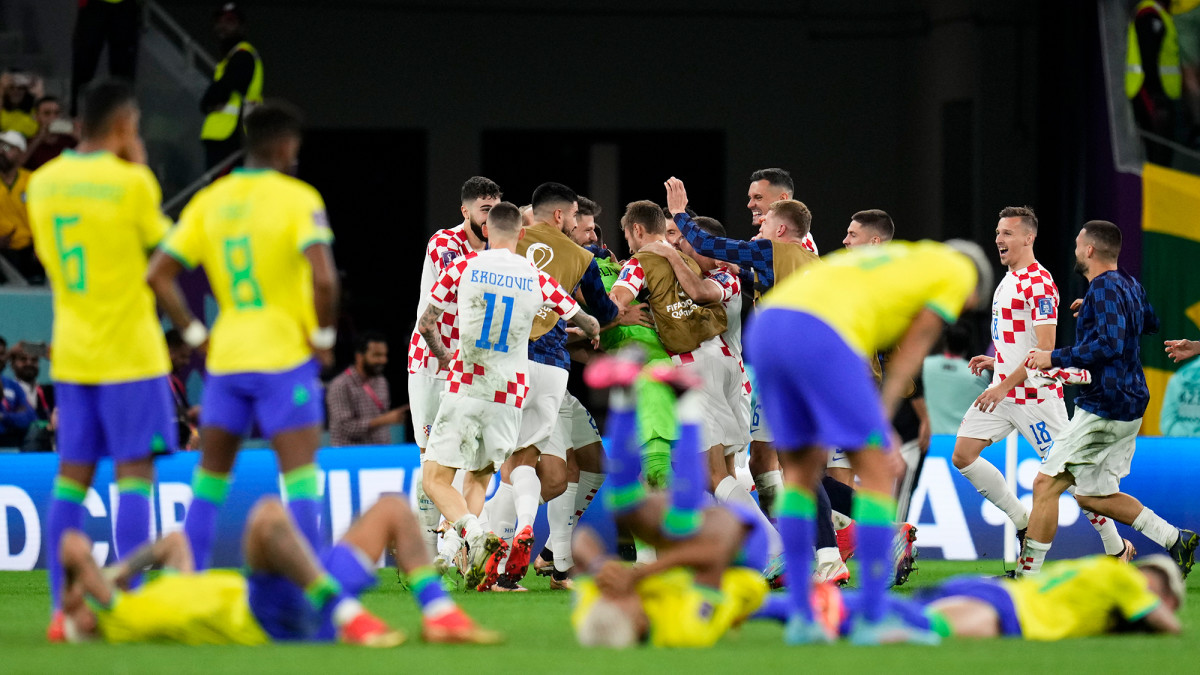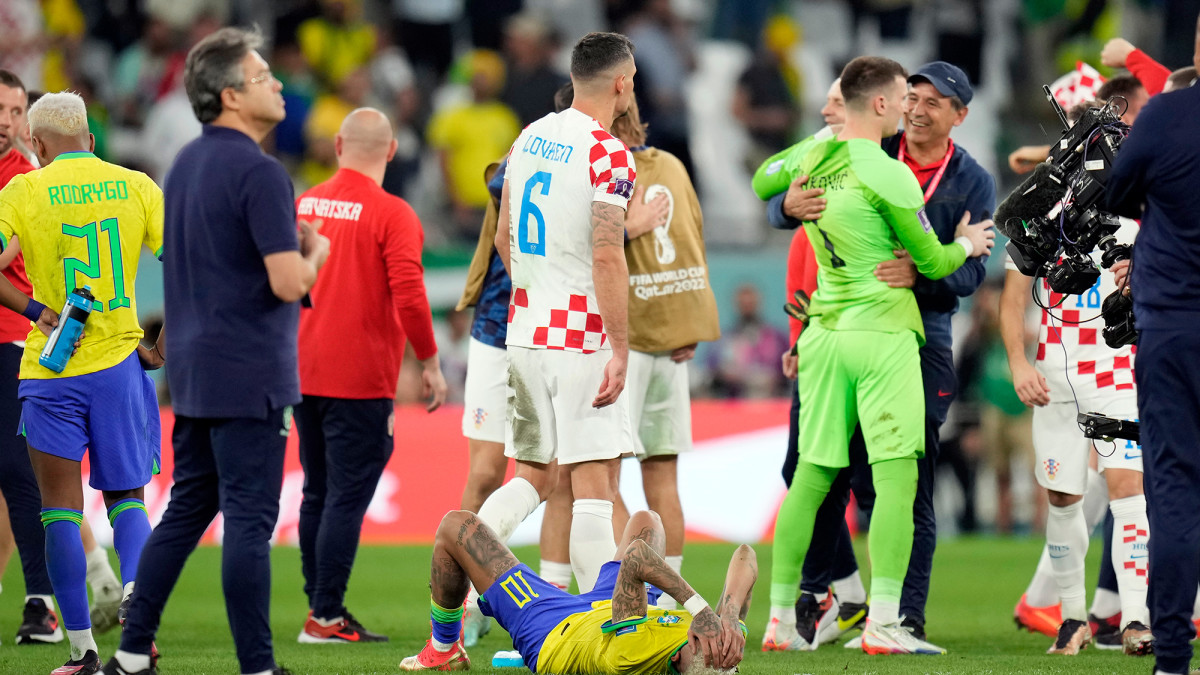Croatia Turns Out the Lights on Brazil’s World Cup Dance
Croatia hasn’t won a World Cup knockout match in regulation since 1998. It’s rarely picked to do anything other than be a “tough out” at major tournaments. Perhaps it’s time those expectations are reconsidered.
The 2018 runner-up dumped consensus favorite and world No. 1 Brazil out of the World Cup on Friday, coming back from a goal down in extra time and outlasting the Seleção in penalty kicks (4–2) following a 1–1 draw, winning a second consecutive shootout—for a second straight World Cup—to return to the semifinals. There, it’ll play Argentina in a 2018 group-stage rematch (Croatia won that 3–0), and it’s guaranteed two more matches in Qatar and another top-four finish one way or another.
In typical Croatian style, it didn’t come easy, and it took added time to make it happen. Those knockout triumphs since 1998 have come through four shootout wins and one extra-time victory. The Vatreni do have that “tough out” label for a reason, and they showed it in Al Rayyan, where Brazil was consistently thwarted, either by a midfield and defense working in perfect harmony to limit opportunities or a brick wall of a goalkeeper when the South Americans finally did break through.
In penalties, Croatia was clinical, while Rodrgyo had Brazil’s opening kick saved, and Marquinhos hit the post with its fourth and ultimately final kick. Neymar, who at one point was the day’s hero until Bruno Petković’s 117th-minute goal—Croatia’s only shot on target—rendered that moot, never got a chance to shoot, presumably positioned as Brazil’s final kick taker.
Brazil’s World Cup title drought, which stretches back to 2002, will extend for at least another four years, while Croatia has positioned itself for the chance to reach the final for a second straight time.
Here are three thoughts on a remarkable quarterfinal match:

Livaković cements his legend
Four years after Danijel Subasić became a World Cup hero for steering back-to-back penalty wins, Dominik Livaković is pulling off quite the impression.
The shootout antics are one thing, with Livaković following his three-save performance against Japan by making “only” one against Brazil. Perhaps putting Rodrygo as the opening taker was a tactical mistake by manager Tite. The 21-year-old is not a regular on the spot for Real Madrid, and taking the first kick sets the tone for a side, especially considering the emotional baggage that seemingly comes with every Brazilian knockout match at a World Cup. And Livaković’s performance in the lead-up to penalties had to have played a role, psychologically.
He made 11 saves in the match, acting as the safety net Croatia needed while under pressure, and, while few stops, if any, were of the spectacular variety, it was his ability to not put a foot wrong that had him positioned to cut off angles or make things difficult for Brazil’s fleet of attacking players. The 27-year-old Dinamo Zagreb lifer has gone global at this tournament, and his presence makes Croatia as good a bet as any to emerge from its side of the bracket for a second straight World Cup.
Neymar’s crowning achievement becomes a footnote
This was supposed to be a night that ended in happy tears for Neymar, not sobs of uncontrolled sadness.
With Brazil needing a breakthrough, unable to generate anything of note, it turned to its No. 10. His career has been accompanied by unreachable levels of hype, and, on the biggest stage for his country, he delivered. In stoppage time of the first half of extra time, Neymar pulled level with Pelé for his national team’s all-time scoring record. It’s a hallowed mark and one not taken lightly in Brazil. Considering how it was achieved, it had all the markings of a crowning achievement in Neymar’s career, no matter if this was “just” a quarterfinal.
A legendary moment for a Brazilian legend. Neymar gives Brazil the lead at the end of the first half of extra time, but the job’s not done yet...
— SI Soccer (@si_soccer) December 9, 2022
(via @FoxSoccer) pic.twitter.com/jLb4BY8UMZ
Neymar started the sequence, and he finished it. He worked a pair of quick-hitting combinations with Rodrygo and Lucas Paquetá to carve through the Croatian defense and then rounded Livaković to create the only clear shooting lane there had been for Brazil all game. He finished and celebrated with pure emotion, one befitting of the moment. He had put his country on his back and come through. He had, seemingly, kept the train moving toward the sixth star over the crest. He had, fittingly, matched Pelé with a goal of Pelé’s quality. He’ll still be tied with O Rei atop the scoring charts, and, unless he retires from the national team—he has hinted that this could be his last World Cup, even though he is only 30—he’ll hold that record by himself. But the tears of agony after Marquinhos’s spot kick hit the post say more than any cathartic screams following his goal ever could. What a brutal twist of fate.

Croatia is just different
Brazil had largely coasted through this World Cup (a heavily rotated team losing to Cameroon notwithstanding), but then again, it hadn’t faced a unit as experienced, disciplined, tireless and resistant as Croatia. They may wear a checkerboard, but these players excel at chess at the highest level. Croatia gummed up the passing and dribbling lanes and was both content to allow Brazil to maintain possession to a toothless degree while also being able to prevent the Seleção from feeling in complete control by conjuring stretches of its own possession (also largely toothless) over the opening half. A disjointed game that lacks flow plays right into Croatia’s hands.
The most likely route to success for Brazil, at least early on, appeared to come from Vinícius Júnior’s runs down the left, and it was he who put the first chance on target, curling a chance right into Livaković’s waiting arms five minutes in. Neymar did the same 15 minutes later and also had a deflected free kick make its way to goal. But otherwise, this was not the Brazil that danced its way through South Korea. It was the Brazil that sometimes meets its match when the chips are truly down, in the latter stages of competitions when the opposition is more resolute and the path to goal considerably more narrow. According to TruMedia, Brazil “won” the expected goals battle the first half 0.19–0.17
From there, Livaković stood on his head, making three close-range saves in the second half and another to rob Casemiro just before the end of extra time.
Another key to the Croatian triumph was, unsurprisingly, the play of its midfield. When Luka Modrić, 37, was subbed out in extra time against Japan in the round of 16, it seemed like it could have been the end of an era. The look on his face as he took in the moment and exited appeared to be an honest acknowledgement that this was it for him on the World Cup stage. You never know with penalties, and that’s where that match was headed. Croatia prevailed in the shootout, though, giving Modrić another chance to dazzle under the brightest of lights.
He didn’t disappoint, running the midfield with a combination of short-range and long-range accuracy (105/116 passing for a 91% clip). Such is his stature, that he swapped shirts with his former Real Madrid midfield mate Casemiro at halftime. Modrić converted his penalty to keep Croatia in the ascendancy and will have to find the legs to carry on in the semifinals against another tough opponent. You get the feeling he lives for these moments, though. He certainly operates like it. What a player.
